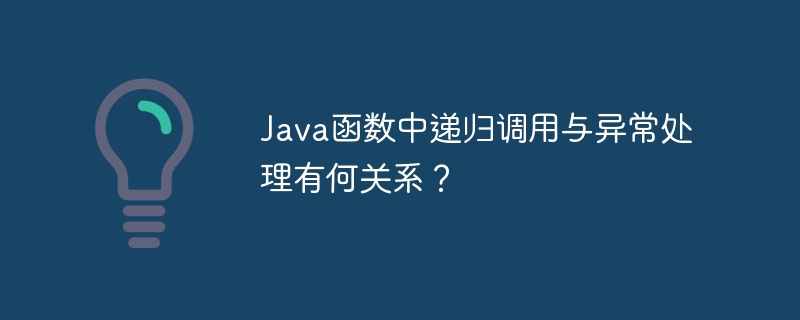Home >Java >javaTutorial >What is the relationship between recursive calls and exception handling in Java functions?
What is the relationship between recursive calls and exception handling in Java functions?
- WBOYWBOYWBOYWBOYWBOYWBOYWBOYWBOYWBOYWBOYWBOYWBOYWBOriginal
- 2024-05-03 18:12:021145browse
Exception handling in recursive calls: Limit recursion depth: Prevent stack overflow. Use exception handling: Use try-catch statements to handle exceptions. Tail recursion optimization: avoid stack overflow.

Recursive calls and exception handling in Java functions
Preface
Recursion Calling is a technique that allows a function to call itself. It's a powerful tool for solving many problems, but it can also cause exceptions. Exceptions are events that occur during code execution, such as an index out of bounds or a null pointer exception.
Understanding Exceptions in Recursive Calls
When a function calls itself recursively, it creates a new function call stack frame. If a recursive call is not terminated correctly, it may run out of memory and cause a stack overflow exception.
Handling exceptions in recursive calls
To handle exceptions in recursive calls, you can use the following techniques:
- Restrictions Recursion depth: Set a maximum recursion depth limit to prevent stack overflow.
- Use exception handling: Use try-catch statements in recursive calls that may throw exceptions. If an exception occurs, it can be handled using a catch block.
- Use tail recursion optimization: For tail recursive functions, the compiler can optimize them to avoid stack overflow.
Practical case
Consider the following recursive function that calculates the factorial:
public static int factorial(int n) {
if (n == 0) {
return 1;
} else {
return n * factorial(n - 1);
}
}If a large value is passed as the parameter of this function, it may Will cause a stack overflow exception. To solve this problem, you can use exception handling:
public static int factorial(int n) {
try {
if (n == 0) {
return 1;
} else {
return n * factorial(n - 1);
}
} catch (StackOverflowError e) {
System.out.println("堆栈溢出异常");
return -1;
}
}Now, if the function is passed a large value (e.g. 10000), it catches the stack overflow exception and returns -1.
The above is the detailed content of What is the relationship between recursive calls and exception handling in Java functions?. For more information, please follow other related articles on the PHP Chinese website!
Related articles
See more- What types of exceptions are there in Python? Introduction to python exception handling
- What is the Overflow property in CSS? Detailed explanation of Overflow attribute
- How to use text-overflow:ellipsis in Firefox
- Learn new CSS features: Directional clipping overflow:clip
- Go's solution to stack overflow problems

